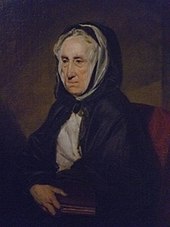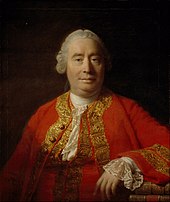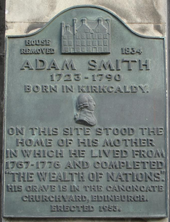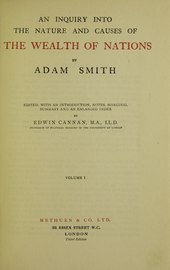Adam Smith
Smith refuses to explain the distribution of wealth and power in terms of God's will and instead appeals to natural, political, social, economic, legal, environmental and technological factors and the interactions among them.
[6] Smith studied social philosophy at the University of Glasgow and at Balliol College, Oxford, where he was one of the first students to benefit from scholarships set up by fellow Scot John Snell.
[16] In Book V, Chapter II of The Wealth of Nations, he wrote: "In the University of Oxford, the greater part of the public professors have, for these many years, given up altogether even the pretence of teaching."
[22][23] In Book V of The Wealth of Nations, Smith comments on the low quality of instruction and the meager intellectual activity at English universities, when compared to their Scottish counterparts.
He attributes this both to the rich endowments of the colleges at Oxford and Cambridge, which made the income of professors independent of their ability to attract students, and to the fact that distinguished men of letters could make an even more comfortable living as ministers of the Church of England.
In their writings covering history, politics, philosophy, economics, and religion, Smith and Hume shared closer intellectual and personal bonds than with other important figures of the Scottish Enlightenment.
He based his explanation, not on a special "moral sense" as the Third Lord Shaftesbury and Hutcheson had done, nor on utility as Hume did, but on mutual sympathy, a term best captured in modern parlance by the 20th-century concept of empathy, the capacity to recognise feelings that are being experienced by another being.
[34] At the end of 1763, he obtained an offer from British chancellor of the Exchequer Charles Townshend—who had been introduced to Smith by David Hume—to tutor his stepson, Henry Scott, the young Duke of Buccleuch as preparation for a career in international politics.
[50] Smith's literary executors were two friends from the Scottish academic world: the physicist and chemist Joseph Black and the pioneering geologist James Hutton.
[59] Smith has been alternatively described as someone who "had a large nose, bulging eyes, a protruding lower lip, a nervous twitch, and a speech impediment" and one whose "countenance was manly and agreeable".
[71] The publication in 1777 of Smith's letter to William Strahan, in which he described Hume's courage in the face of death in spite of his irreligiosity, attracted considerable controversy.
[75] In the work, Smith critically examines the moral thinking of his time, and suggests that conscience arises from dynamic and interactive social relationships through which people seek "mutual sympathy of sentiments.
The feedback received by an individual from perceiving (or imagining) others' judgment creates an incentive to achieve "mutual sympathy of sentiments" with them and leads people to develop habits, and then principles, of behaviour, which come to constitute one's conscience.
[82] Otteson argues that both books are Newtonian in their methodology and deploy a similar "market model" for explaining the creation and development of large-scale human social orders, including morality, economics, as well as language.
We address ourselves, not to their humanity but to their self-love, and never talk to them of our own necessities but of their advantages.However, in The Theory of Moral Sentiments he had a more sceptical approach to self-interest as driver of behaviour:How selfish soever man may be supposed, there are evidently some principles in his nature, which interest him in the fortune of others, and render their happiness necessary to him, though he derives nothing from it except the pleasure of seeing it.In relation to Mandeville's contention that "Private Vices ... may be turned into Public Benefits",[90] Smith's belief that when an individual pursues his self-interest under conditions of justice, he unintentionally promotes the good of society.
Self-interested competition in the free market, he argued, would tend to benefit society as a whole by keeping prices low, while still building in an incentive for a wide variety of goods and services.
The proposal of any new law or regulation of commerce which comes from this order, ought always to be listened to with great precaution, and ought never be adopted till after having been long and carefully examined, not only with the most scrupulous but with the most suspicious attention.
Smith was controversial in his own day and his general approach and writing style were often satirised by Tory writers in the moralising tradition of Hogarth and Swift, as a discussion at the University of Winchester suggests.
It is that, under competition, owners of resources (for example labour, land, and capital) will use them most profitably, resulting in an equal rate of return in equilibrium for all uses, adjusted for apparent differences arising from such factors as training, trust, hardship, and unemployment.
[106] Paul Samuelson finds in Smith's pluralist use of supply and demand as applied to wages, rents, and profit a valid and valuable anticipation of the general equilibrium modelling of Walras a century later.
Smith's allowance for wage increases in the short and intermediate term from capital accumulation and invention contrasted with Malthus, Ricardo, and Karl Marx in their propounding a rigid subsistence–wage theory of labour supply.
[113] Neoclassical economics systematised supply and demand as joint determinants of price and quantity in market equilibrium, affecting both the allocation of output and the distribution of income.
He is at all times surrounded by unknown enemies, whom, though he never provoked, he can never appease, and from whose injustice he can be protected only by the powerful arm of the civil magistrate continually held up to chastise it.
The first proposal called for giving the colonies their independence, and by thus parting on a friendly basis, Britain would be able to develop and maintain a free-trade relationship with them, and possibly even an informal military alliance.
[121] As Marc-William Palen notes: "On the one hand, Adam Smith's late nineteenth and early twentieth-century Cobdenite adherents used his theories to argue for gradual imperial devolution and empire 'on the cheap'.
[131] Smith also appears as the narrator in the 2013 play The Low Road, centred on a proponent on laissez-faire economics in the late 18th century, but dealing obliquely with the 2007–2008 financial crisis and the Great Recession; he was portrayed by Bill Paterson in the premiere production at the Royal Court Theatre in London.
He viewed government intervention in the market with great skepticism...yet he was prepared to accept or propose qualifications to that policy in the specific cases where he judged that their net effect would be beneficial and would not undermine the basically free character of the system.
In Stein's reading, The Wealth of Nations could justify the Food and Drug Administration, the Consumer Product Safety Commission, mandatory employer health benefits, environmentalism, and "discriminatory taxation to deter improper or luxurious behavior".
[151] In addition, he allowed that in some specific circumstances, retaliatory tariffs may be beneficial: The recovery of a great foreign market will generally more than compensate the transitory inconvenience of paying dearer during a short time for some sorts of goods.
(The Wealth of Nations, Book 1, Chapter 8)However, Smith also noted, to the contrary, the existence of an imbalanced, inequality of bargaining power:[159] A landlord, a farmer, a master manufacturer, a merchant, though they did not employ a single workman, could generally live a year or two upon the stocks which they have already acquired.











